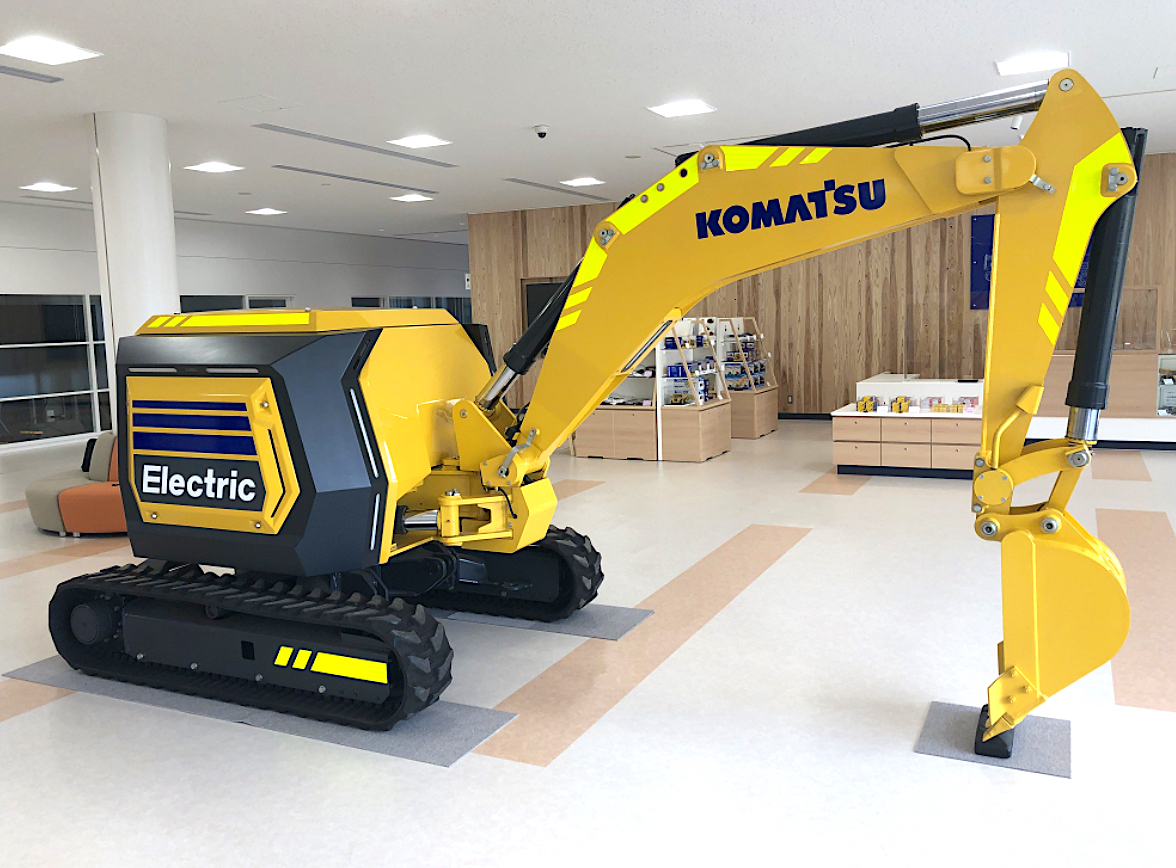Why the Double E Volvo rc excavator Is a Game-Changer for Efficiency and Safety
Understanding Just How Excavator Functions and Its Effect On Performance
Excavators play a crucial role in building and construction and mining procedures, relying on an intricate interaction of mechanical and hydraulic systems. Their capacity to do a selection of jobs rests on both their design and the innovation incorporated within. Understanding these components can significantly influence operational performance and productivity. As developments remain to improve the market, one have to think about exactly how these modifications will certainly affect future practices and performance.
The Basics of Excavator Mechanics

The Function of Hydraulic Equipments in Excavators
At the heart of excavator procedure lies the hydraulic system, which plays a crucial function in powering the device's motions and functions. This system uses pressurized hydraulic liquid to move power, enabling different actions such as training, excavating, and moving. By using the principles of hydraulics, excavators can do tasks with impressive precision and pressure, improving overall functional efficiency.The hydraulic system contains crucial parts, including valves, cyndrical tubes, and pumps, which collaborate to control the flow and direction of the fluid. When the driver involves the controls, the hydraulic liquid is guided to specific cyndrical tubes, translating the operator's commands into physical motion. This device enables for receptive and smooth activities, which are necessary in building and construction and excavation environments. double e volvo rc excavator. The efficiency of the hydraulic system directly impacts the performance and convenience of the excavator, making it a crucial element in contemporary excavation processes
Key Parts of an Excavator
Understanding the crucial components of an excavator is necessary for understanding just how this effective equipment runs. An excavator includes several significant aspects, including the undercarriage, house, arm, pail, and boom. The undercarriage offers stability and movement, commonly including tracks or wheels to navigate numerous surfaces. The residence consists of the engine and hydraulic systems, allowing the operator to regulate motion and power the equipment. The boom extends from your home, making it possible for vertical reach, while the arm links to the pail, assisting in excavating and training operations.Additionally, the taxi houses the driver, outfitted with controls for exact handling. Each of these elements plays an essential duty in the excavator's total capability, contributing to its effectiveness and efficiency on construction sites. Recognizing these parts aids in keeping and enhancing excavator performance, ensuring jobs are completed safely and effectively.
Accessory Convenience and Its Benefits
Accessory adaptability is a crucial aspect of excavators, making it possible for operators to change between various devices tailored for particular jobs. This versatility not just improves job performance yet additionally adds to cost-effectiveness by minimizing the requirement for numerous devices. Comprehending the different sorts of accessories available can considerably influence the general performance and capability of an excavator on task sites.
Sorts of Add-ons
While excavators are primarily acknowledged for their excavating capabilities, their real convenience depends on the wide range of attachments offered. These add-ons enhance the excavator's performance, allowing it to execute different jobs past excavation. Common accessories consist of pails (for excavating and scooping), hydraulic thumbs (for comprehending materials), and augers (for piercing holes) Grapples are made use of for moving and taking care of particles, while rippers can break up hard surface areas. Various other specialized add-ons, such as trenchers and plows, enable excavators to adjust to particular task demands. This variety not just boosts the equipment's energy across different fields, including demolition, landscaping, and building and construction, however additionally enables operators to tailor their equipment to satisfy particular project demands successfully.
Increased Job Performance
Taking full advantage of task effectiveness is a main benefit of utilizing different excavator add-ons. Different attachments permit an excavator to carry out several tasks without requiring to change equipment, saving important time and labor. For example, using a hydraulic hammer can damage concrete while a pail accessory can dig deep into soil, making it possible for a smooth operations. This convenience decreases downtime related to equipment adjustments and enhances efficiency on-site. Furthermore, specialized attachments improve precision in jobs such as grading or landscape design, causing better end results. The ability to adjust to different task needs not just enhances procedures however also decreases the demand for added equipment, ensuring that tasks are finished promptly and properly. In general, add-on flexibility substantially contributes to increased task performance in excavation job.
Cost-Effectiveness and Flexibility
Cost-effectiveness is a significant benefit of utilizing versatile excavator add-ons. These attachments allow a single excavator to perform multiple jobs, lowering the need for added equipment and labor - double e volvo rc excavator. By switching over in between containers, hammers, and grapples, operators can tackle numerous projects, from excavating to demolition, thus making the most of equipment utilization. This adaptability not just reduces operational prices however additionally decreases downtime connected with altering equipment. In addition, the capacity to personalize excavators with specialized add-ons improves productivity, as they can successfully deal with diverse tasks according to task demands. In conclusion, the combination of cost-effectiveness and convenience in excavator accessories adds to enhanced operational performance and resource allowance in building and construction and excavation projects

Advanced Technology in Modern Excavators
Modern excavators are significantly outfitted with sophisticated innovation that transforms excavation procedures. Automation simplifies procedures, while improved fuel performance lowers operational expenses. Additionally, clever control systems improve accuracy and security, marking a substantial development in excavation equipment.
Automation in Excavation Processes
As excavation technology advances, automation has become an essential element in boosting effectiveness and precision on task sites. Modern excavators are furnished with advanced automated systems that promote tasks such as grading, excavating, and trenching with minimal driver intervention. These systems use sensing units, GPS, and device understanding algorithms to assure accurate placing and depth control, considerably reducing the margin for mistake. In addition, automation permits operators to focus on calculated decision-making rather than manual controls, resulting in boosted efficiency on the whole. Such developments not only simplify workflows yet likewise improve safety and security by lessening human mistake in complicated operations. The combination of automation in excavation procedures stands for a considerable innovation in building and construction innovation, driving the sector in the direction of greater effectiveness and performance.
Enhanced Gas Efficiency
Innovations in innovation have likewise led to significant renovations in gas efficiency for contemporary excavators. Modern devices are equipped with sophisticated engines that enhance power result while lowering gas intake. These engines make use of cutting-edge burning technologies, such as turbocharging and direct fuel shot, to enhance efficiency and effectiveness. Additionally, light-weight products in building minimize total weight, permitting much less energy expenditure throughout procedure. The introduction of variable speed controls enables drivers to change engine efficiency according to details jobs, even more lessening fuel use. Therefore, these improvements not only reduced functional prices however also add to ecological sustainability by decreasing discharges. Overall, enhanced gas effectiveness in excavators is a vital development that strengthens efficiency and economic stability in the building industry.
Smart Control Solution
While drivers navigate significantly complex work sites, clever control systems in excavators have become important devices for enhancing performance and precision. These innovative innovations utilize sensing units and algorithms to check various criteria such as load weight, surface conditions, right here and functional performance. By immediately readjusting hydraulic functions, clever systems optimize maker efficiency, leading to boosted productivity and decreased endure elements. Furthermore, operators profit from user-friendly interfaces that provide real-time feedback and diagnostics, enabling informed decision-making. This integration of technology not just streamlines operations yet likewise lessens human mistake, adding to safer work environments. As the building industry proceeds to advance, smart control systems will certainly play an important function fit the future of excavator efficiency and effectiveness.
Enhancing Functional Efficiency With Excavators
Excavators play a vital function in boosting operational effectiveness throughout different construction and excavation tasks. Their convenience permits several jobs, consisting of material, digging, and training handling, which improves process and decreases the need for additional devices. With powerful hydraulic systems, excavators can carry out durable tasks with accuracy, significantly reducing the time called for to complete projects. The combination my link of sophisticated innovation, such as GPS and automated controls, further enhances their operation, enabling drivers to attain better accuracy and minimize material waste. In addition, modern excavators are designed to eat much less gas and lessen exhausts, contributing to both expense financial savings and ecological sustainability. By making use of excavators properly, construction groups can improve productivity, fulfill job deadlines, and improve total website administration. This multifunctionality and performance make excavators vital tools in the modern-day building landscape.
The Future of Excavators in Building And Construction and Mining Industries
As the building and mining industries progress, the future of excavators is poised for considerable transformation driven by technical development and transforming operational needs. Advances in automation and fabricated intelligence are improving excavator capabilities, permitting enhanced accuracy and efficiency in operations. Independent excavators are emerging, minimizing the demand for human intervention and lessening the threat of accidents.Moreover, the integration of telematics and IoT modern technology enables real-time tracking of maker efficiency and predictive upkeep, maximizing uptime. Environment-friendly layouts, including hybrid and electric designs, are gaining grip, lining up with sustainability objectives within the industry.Additionally, using advanced products and lighter designs boosts gas efficiency while keeping performance criteria. As these trends progress, excavators will certainly play a vital duty in satisfying the boosting needs for performance and security in construction and mining, ultimately changing operational landscapes.
Often Asked Inquiries
Exactly How Do Climate Conditions Impact Excavator Efficiency?

Weather substantially affect excavator performance, as rain and mud can hinder traction and security, while severe temperature levels might impact hydraulic systems. More Info Operators needs to adapt to these variables to guarantee optimal performance and safety throughout operations.
What Safety And Security Measures Should Operators Follow While Utilizing Excavators?
Precaution for excavator operators consist of using suitable personal protective equipment, conducting pre-operation inspections, making certain correct interaction with ground workers, keeping a secure range from above dangers, and sticking to well established functional procedures to stop accidents.
How Commonly Should Excavators Be Kept for Optimum Efficiency?
Excavators need to be maintained consistently to ensure peak performance, usually every 250 operating hours or as defined by the maker. Routine checks enhance integrity, avoid unanticipated breakdowns, and expand the lifespan of the tools.
What Is the Average Life-span of an Excavator?
The ordinary life expectancy of an excavator commonly ranges from 10,000 to 15,000 hours of procedure. Elements affecting long life include maintenance methods, operating problems, and the top quality of the equipment itself, influencing total productivity and efficiency.

Can Excavators Operate Irregular Terrain Efficiently?
Excavators can operate efficiently on irregular surface because of their expressed designs and flexible tracks. These functions allow them to preserve security and traction, allowing efficient operation in difficult settings commonly come across in building and construction and landscape design jobs. Each of these elements plays a crucial function in the excavator's general performance, adding to its performance and effectiveness on building and construction websites. Making best use of work performance is a primary benefit of using numerous excavator accessories. While operators browse significantly complicated task websites, smart control systems in excavators have actually emerged as important devices for boosting effectiveness and accuracy. Excavators play a crucial function in enhancing functional efficiency throughout different construction and excavation projects. Breakthroughs in automation and fabricated knowledge are reshaping excavator capacities, enabling for enhanced precision and effectiveness in procedures.